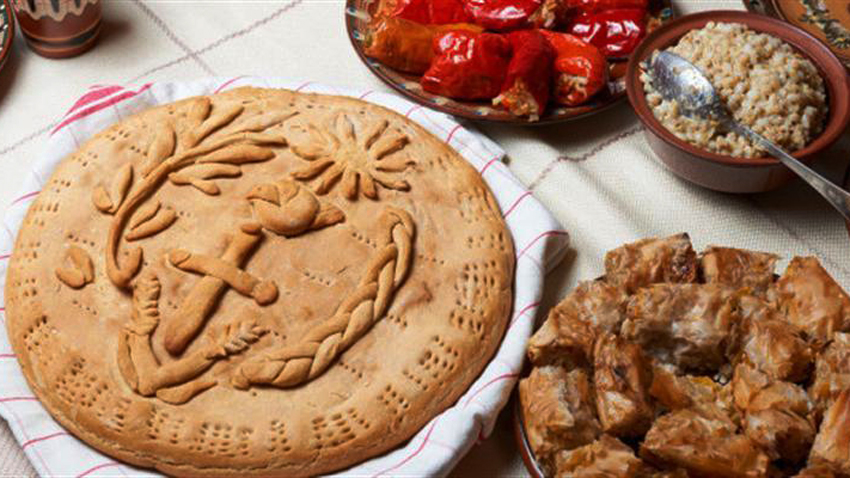Christmas Eve, a day of humility, thankfulness and hope. Though not all people in Bulgaria observe the Nativity fast throughout the entire period designated – 40 days - all families sit down to a festive meal together. To several generations, the people who grew up in the period from the 1940s till the 1980s, celebrating Christmas was fairly unknown or was an intimate, family affair. In recent decades we have been reverting to tradition and it would be no exaggeration to say that every school, cultural centre, museum organizes reenactments of ancient rituals. It would be impossible to tell you about all customs and traditions, connected with Christmas Eve, but we shall offer you songs of yore that convey the spirit of this day.
When Bulgaria was converted to Christianity in the 9th century, the traditional and the Christian calendar converged, especially on major fetes. The Christian saints started to appear in folk songs, as did the infant Jesus.
 There are rigid rules for the Christmas Eve fare – with no meat and an odd number of dishes on the table, at least seven. The food must include boiled wheat, cabbage leaves stuffed with rice or groats, stewed dried fruit, onions, garlic, honey, fresh fruit, wine, rakia (brandy)… To this day many women bake ritual loaves of bread with special decorations. It is believed that the symbols, made out of dough shall bring fertility and prosperity. Once, the ritual food was laid out on straw on the floor and covered with a newly woven piece of cloth. The food would not be cleared away – it was believed that the spirits of the deceased family members would come in the night to eat. And the fire in the hearth was not to be allowed to go out.
There are rigid rules for the Christmas Eve fare – with no meat and an odd number of dishes on the table, at least seven. The food must include boiled wheat, cabbage leaves stuffed with rice or groats, stewed dried fruit, onions, garlic, honey, fresh fruit, wine, rakia (brandy)… To this day many women bake ritual loaves of bread with special decorations. It is believed that the symbols, made out of dough shall bring fertility and prosperity. Once, the ritual food was laid out on straw on the floor and covered with a newly woven piece of cloth. The food would not be cleared away – it was believed that the spirits of the deceased family members would come in the night to eat. And the fire in the hearth was not to be allowed to go out.
At the beginning of December, the Christmas Eve and Nativity rituals were presented at the Regional Library in Blagoevgrad to an audience of children aged 10-11. Reenactments of the scene “Around the hearth on Christmas Eve” were also organized in the Regional Museum of History in Turgovishte. The Tradition and Folklore children’s club in Pleven put on the show for children Koledari, presenting the Christmas Eve meal and what it includes, different customs, with fun and games that everyone could join in. Alongside demonstrations of traditional Bulgarian customs and rituals, in Plovdiv, European capital of culture in 2019, visitors will be able to see the scene of the birth of the infant Jesus in the manger, reenacted by last-year students from the National School for Performing and Screen Arts. Of course, it is in villages that folklore traditions are revived most colourfully, even if it is villages in the outskirts of Sofia like Bistritsa, Vladaya, German, Lozen.
English version: Milena Daynova
The Bulgarian folklore dance group Vito Horo from Perth will take part in the multicultural women’s festival Harmony of Colours, taking place tonight in the Australian city, the Bulgarian association Rodina has announced. Besides the Bulgarian..
The resort towns along Bulgaria’s Black Sea coast can be broadly categorized into two types: modern ones, characterized by their lively and colorful streets, and port cities with a rich history. Various settlers have passed through these port towns,..
The 14th World Folklore Championship, "World Folk 2024" , starts today and runs until August 30 at three locations on Bulgaria's Black Sea coast: Nessebar, Sunny Beach and Sveti Vlas. The event kicks off tonight at the Jana Chimbuleva Amphitheatre in the..
Christmas Eve, once called Budnik, Little Christmas or Neyadka, was considered part of a dark, frightening period, charged with the potential to..
On Christmas morning the glad tidings have spread that the Son of God was born, making it a special day celebrated with a lot of festive rituals. After..

+359 2 9336 661
